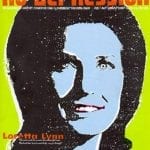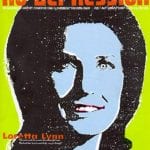Hank Cochran – All we did was write part of our lives
ND: Were you and Harlan Howard both working in California when you met?
HC: He was in California, so was I, but we met here, in Tennessee. I came back here in January of 1960. I moved to Nashville, come here on a bus and there was snow up to the kazoos when I got off that bus. And there I am in this little seersucker suit from California. Cold. And nobody to meet me because you couldn’t even get to the bus station.
So I called Mom Upchurch, because I had stayed there [at her rooming house] a few days during the disc jockey convention in ’59. And I said, “Mom, this is Garland, I stayed with you during the disc jockey convention, and I was wondering if I could stay a few days with you now. I’m in town.” And she said, “Well, son, everybody over here’s got the croup.” I said, “Mom, if I stay out here in the snow I’m gonna die anyway.” She said, “Well, you’re right, have you got any money?” And I said, “Well…” “Fine.” And she said, “Well, I was going to tell you to catch you a cab over here” — 36 Boscobel, right over the Shelby Street Bridge from the bus station, which was right downtown on Fourth or Fifth. She said she would pay him; “I know you would be good for it.” And I said, “Well, I’m goin’ try to be.”
I went to work, and I stayed there with her for, I think, $10 a week. She was full at the present time, and, who turned out to be Johnny Paycheck was there. He was Donny Young then. And Darrell McCall was there. He was Darrell Young, cuz they was supposed to been brothers, but they wasn’t. And Shorty Lavender, who turned out, you know, running the big [talent] agency, he was playing fiddle for Ray Price at the time, and he was living there. And Howard White, who was playing steel for Hank Snow at the time. Ah, George McCormick…gosh, I can’t believe I remember all these, I tried the other day to think of some of these people and it just would NOT come. But George McCormick, he was working for, ah, Wilma Lee and Stoney Cooper, I think. They took me in, and when somebody would go on the road, I’d sleep in their bed [laughs]. And then when they’d come back, somebody else’d be gone, until somebody moved out.
I lived there for I don’t know how long. And then me and Darrell McCall got a little place where we had a room of our own [laughs]; two rooms of our own. Somewhere around in there I moved my family back here. I had a wife and three kids back in L.A. When I first got here, I was sending half of my $50 a week back to them, and paying Mom Upchurch $10 of it, and that left me with $15 to buy gas — they bought me a ’40-something Chevrolet Coupe to ride to work in and pitch songs, when I went to work for Pamper — and so [$15] to buy gas and buy beer, which kinda eliminated the food [laughs], but that’s the way it was for quite a while.
I knew people that was workin’ the Opry, and they let me do spots. You got paid $10 for the first spot, and $3 for the next spot, so there was a chance sometimes you got $13. And if you worked like the Prince Albert deal, the network part, seemed like $25 or something big, you know. [laughs] Or $15, something. But that was a lot of money when you didn’t have any.
II. THAT’S WHY THE LAST PART OF THE OPRY ALWAYS SOUNDED A LITTLE LOOSE
ND: Nashville has changed some, I gather.
HC: Oh, Nashville has changed some. When we all picked up there in the top part of the back of Tootsie’s, we’d pick until she’d run us out of there with hat pins. And she didn’t mind sticking it in your hind end, neither. You could go out the back door and go right in the back door to the Opry. So if we were doing a spot on the Opry we’d get through with that, walk across the alley, and set upstairs, and nobody’d bother you up there, you know, just sit up there and drank beer until you had to go back over. That’s why the last part of the Opry always sounded a little loose [laughs].
Everybody knew everybody, and they’d just pass the guitar around. If you got anything you wanted to sing, sing it, and you didn’t have to worry about somebody stealing it, and if somebody liked it…That’s where I heard Willie Nelson, and I said, “Who wrote those songs?”
Billy Walker, he introduced me to Willie Nelson, says, “This is a friend of mine from Texas, just came up here.” We talked and visited, and when we got to passin’ the guitar it come to him, whew! He’d lay down on it a little bit; he could out-pick all of us, but he wouldn’t show us up, y’know, too bad [laughs]. Be nice, and Red [Lane] was thataway, too, but I said, “Who wrote those songs?” And he said, “I did.” And I said, “Who is you with, the publishing company?” And he said, “I ain’t with nobody, nobody wants ’em.” I said, “Gosh, come out to the office, I sure would like to talk to you.”
So he came out to this company that I’d just went to work for, making $50 a week, sang me a bunch of songs. That’s when Pamper had just started, and they didn’t have hardly any writers at all. No, they didn’t HAVE any writers, I was one of the very few that was signed exclusive. I talked them into signing Willie, I gave him half of my…they were going give me a raise, because I had some hits.
That’s where Faron Young heard “Hello Walls”, down at Tootsie’s. We took it over to him the next day. It was a acetate. I had to take a 7-1/2 [reel to reel tape]; after you made a demo [acetate], [you] made a little 7-1/2, and then you took that and went all over and played it for whoever on your Wollensak. [laughs] That oughtta be a classic deal in the Songwriter’s [Hall of Fame] because that was THE instrument. It wasn’t a guitar. Everybody in town, every song pitcher, plugger or whatever, had a Wollensak, and they all were just alike, and if you didn’t bring yours you could borrow somebody else’s [laughs]. But that was it. It has been a lot of changes.




